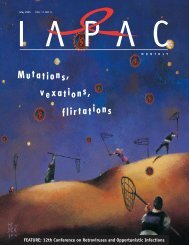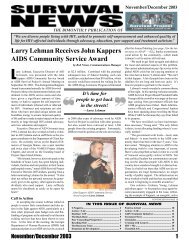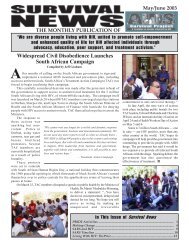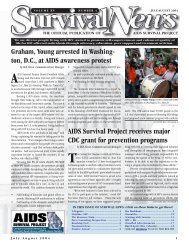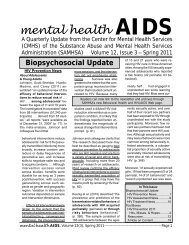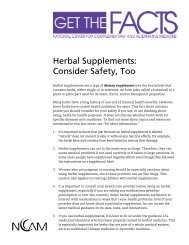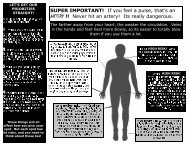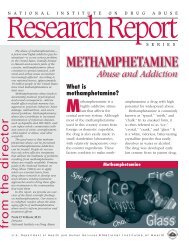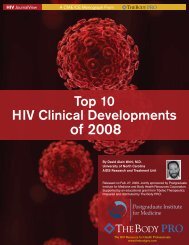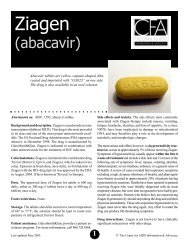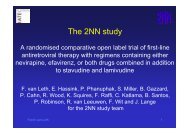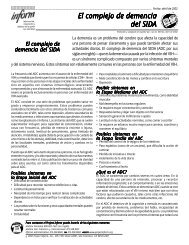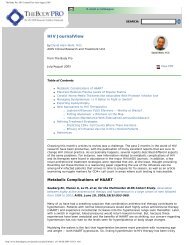The Positive Side (Winter 2013) - CD8 T cells - The Body
The Positive Side (Winter 2013) - CD8 T cells - The Body
The Positive Side (Winter 2013) - CD8 T cells - The Body
Create successful ePaper yourself
Turn your PDF publications into a flip-book with our unique Google optimized e-Paper software.
Claudia Medina grew up in a<br />
rough neighbourhood of Toronto. <strong>The</strong><br />
only child of a single mother, who emigrated<br />
from Bogotá, Colombia, when<br />
Claudia was just five, she led a protected<br />
life. Her mother sent her to<br />
Catholic schools in the safer parts of<br />
town because she didn’t want Claudia<br />
spending time in their neighbourhood.<br />
Change came when Claudia was 15<br />
and landed her first job, at a theatre.<br />
“I began to make friends and socialize<br />
beyond my sheltered world,” she says.<br />
Claudia became best friends with a<br />
young man whom she fell in love with.<br />
Shortly after they met, she began<br />
attending his Presbyterian church. At<br />
age 16, influenced by his religious<br />
practices, Claudia became a bornagain<br />
Christian. Her life plan included<br />
marriage, four children, a nice house<br />
and a white picket fence.<br />
But Claudia was also a teenager who<br />
was discovering her sexuality. “Sex<br />
before marriage for me was always<br />
wracked with guilt,” she says. “I was<br />
young and full of sexual desires, including<br />
bisexual ones, but the church had<br />
taught me that to act on these without<br />
being married was sinful, so I rarely en -<br />
joyed sex. <strong>The</strong> solution was to hide my<br />
bisexual desires and to get married.”<br />
Not long after becoming engaged,<br />
Claudia began to realize that something<br />
wasn’t quite right between her and her<br />
fiancé. <strong>The</strong>y were both young and<br />
vibrant, yet a sexual spark seemed to be<br />
missing and she wondered why they<br />
had sex so infrequently. “I started having<br />
an affair to avoid the problems my<br />
fiancé and I faced in our relationship,”<br />
she says, which only compounded her<br />
sense of Catholic guilt.<br />
<strong>The</strong>n, one month before their wedding<br />
date, in the middle of a heated<br />
argument, Claudia’s fiancé admitted<br />
that he had been sleeping with men but<br />
wasn’t happy about it and thought it<br />
sinful. Claudia knew that if she blew<br />
the cover off of this, her mother and<br />
family would never let her see him<br />
again and she would lose her love and<br />
best friend. So she decided to believe<br />
her fiancé when he said that he had<br />
closed any gay chapters in his life. <strong>The</strong>y<br />
married as planned.<br />
A s they settled into their new life,<br />
Claudia and her husband knew something<br />
was still amiss. <strong>The</strong>y decided that<br />
having a child might fill the void. In<br />
1993, at age 23, she gave birth to her<br />
son. While pregnant, she had been<br />
physically sick and suffered from<br />
depression. In Latino culture, Claudia<br />
says, women are supposed to be strong<br />
and carry on regardless. “I felt that I<br />
couldn’t reach out to my family because<br />
of my depression but also because I<br />
wanted to shelter them from my marital<br />
problems. And pretending that we<br />
had a great family and great life was all<br />
a part of fitting in at church.”<br />
“We continued to be active in the<br />
church,” she says, “but I slowly be -<br />
gan to realize that organized religion<br />
had fed me many lies.” Claudia and<br />
her husband disclosed their marital<br />
secrets to their minister, whose advice<br />
was to pray and come to him for counselling.<br />
A pivotal moment occurred<br />
when she was talking to the minister’s<br />
wife: <strong>The</strong> subject of a lesbian march<br />
for Gay Pride Day came up. <strong>The</strong> minister’s<br />
wife was vicious in her views on<br />
PROFILE<br />
Claudia Medina’s teen and adult years threw her more than a few curve balls,<br />
taking her life in a direction she could not have foreseen. Today Claudia<br />
educates and supports fellow Latinos and HIV-positive women in prison.<br />
BY PETER CARLYLE-GORDGE<br />
PHOTOGRAPH BY MICHELLE GIBSON<br />
lesbians, which Claudia did not like.<br />
“This so-called Christian woman said<br />
that she wouldn’t let a lesbian even eat<br />
from her dog’s bowl.”<br />
She joined a support group for<br />
women married to bisexual men and<br />
was appalled by what some of them put<br />
up with to keep their marriage going.<br />
One of the women described how her<br />
husband of 12 years always went into<br />
another room to undress. “When I<br />
heard that story,” Claudia reflects, “I<br />
realized that nothing we could do was<br />
going to change the fact that my husband<br />
was attracted to men.” She began<br />
to feel that being bisexual was not<br />
something that needed to be fixed but<br />
something to be embraced.<br />
During her first year as a mother,<br />
Claudia was haunted by doubts,<br />
depression and illness. Isolated and<br />
depressed, Claudia began cutting herself.<br />
Gradually, the marriage deteriorated.<br />
In April 1994, a combination of<br />
ongoing weight loss and concern about<br />
being exposed to HIV led Claudia to take<br />
an HIV test. <strong>The</strong> result was positive.<br />
“<strong>The</strong> diagnosis knocked the wind out of<br />
me,” she recalls. Claudia urged her husband<br />
to get tested; he too was positive.<br />
<strong>The</strong>y continued to support each other<br />
as friends, but the marriage was over.<br />
In 1996 she moved out with her son.<br />
Initially, Claudia blamed her exhusband<br />
for her diagnosis, but “my<br />
real anger was with myself for being so<br />
naive,” she says. “I knew that we could<br />
get HIV, but I refused to take off the<br />
blinders and recognize that HIV could<br />
affect me. Looking back now, I can<br />
connect all the factors that contributed<br />
to my diagnosis: lack of HIV/AIDS information,<br />
my religion, low self-esteem,<br />
<strong>Winter</strong> <strong>2013</strong> THE POSITIVE SIDE<br />
9



